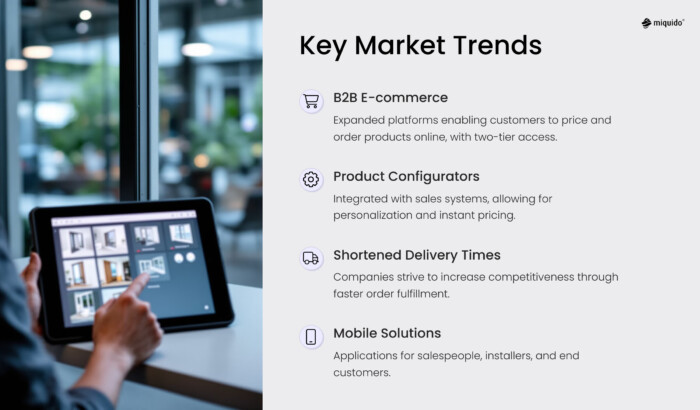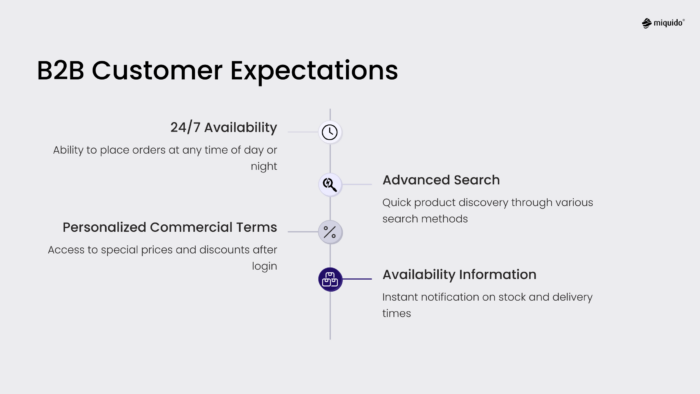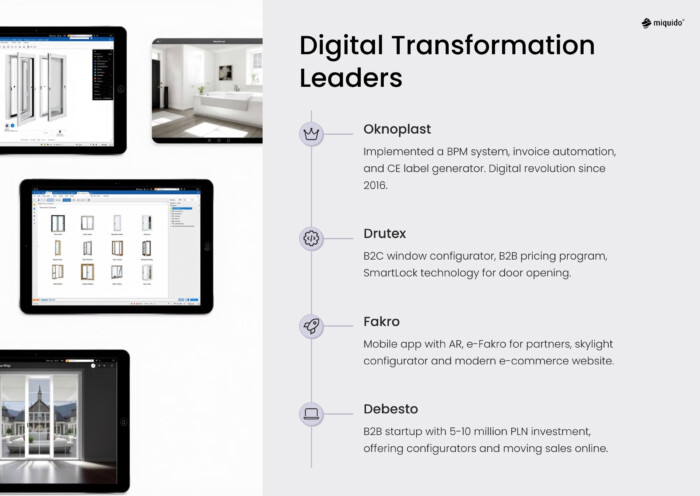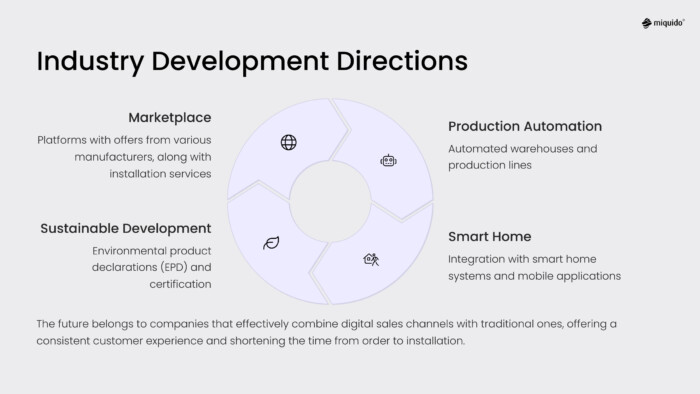Product configurators are transforming the manufacturing industry, and joinery is where they are most in demand due to its need for personalization and a complex sales process. But it doesn’t stop there—today’s business customers expect features that many B2B manufacturing platforms lack.
So, what should a platform and its configurators include to drive higher margins instead of abandoned carts? Our market research for an Industry 4.0 client identified key requirements.
Background and challenges
A client in the Industry 4.0 sector, operating in the manufacturing industry, identified a lack of transparency and efficiency in its B2B system. The existing platform for managing dealers and business clients was outdated, unintuitive, and lacked the necessary tools for order personalization and sales automation.
In response to growing B2B customer expectations, the client planned to implement an innovative product configurator to simplify the ordering process, improve pricing efficiency, and enable integration with e-commerce and CRM systems. However, before the implementation, a competitive analysis was necessary to identify best practices and key market functionalities.
Scope of analysis
The study included a comprehensive competitive analysis and the identification of the most effective B2B solutions in the industry, focusing on:
- Product Configurators – key features, personalization, and order automation.
- B2B Platforms for Dealers – systems enabling effective business relationship management.
- Claims and After-Sales Systems – approaches to handling customer inquiries and technical support
- IT Integrations – linking B2B systems with e-commerce, ERP, and CRM solutions.

Key findings
1. Advanced product configurators
The analysis revealed that the most efficient B2B product configuration systems include:
✔ Automated pricing – real-time dynamic price calculations.
✔ Integration with inventory systems – live availability checks.
✔ 3D and AR visualization – allowing customers to preview their customized product.
✔ Order personalization – enabling adjustments based on specific client requirements.

2. Optimization of B2B platforms for dealers
The best market solutions provide:
✔ Self-service modules – 24/7 access to pricing, quotes, and order status.
✔ Tiered access levels – different views for wholesale and retail clients.
✔ Enhanced logistics integration – reducing order fulfillment times.
3. Modern Claims Management Systems
To improve after-sales service, leading companies implemented:
✔ Automated claims processing – online complaint registration with instant warranty verification.
✔ CRM integration – tracking customer history and improving response efficiency.
✔ Real-time notifications – informing clients about claim status updates.
4. IT Integrations and Automation
The most optimized systems featured:
✔ E-commerce integration – allowing direct order placement and online pricing.
✔ ERP connectivity – ensuring synchronization of orders, inventory, and production.
✔ AI and Machine Learning – analyzing sales data and personalizing offers.

Implemented recommendations and client benefits
Based on the analysis, a set of strategic recommendations was developed to enhance sales processes and market competitiveness. The implemented changes included:
- New product configurator – automated pricing, inventory integration, and 3D visualization.
- Expanded B2B platform – self-service module for dealers and wholesale clients.
- Optimized claims system – digital submissions, automated notifications, and CRM integration
- Seamless ERP and e-commerce integration – streamlined order processing and inventory synchronization.
Conclusion
Through market analysis and the adoption of advanced solutions, the client successfully optimized B2B operations, aligning with the Industry 4.0 framework. The automation of sales processes, an innovative product configurator, and an improved claims management system significantly enhanced operational efficiency and market competitiveness.


![[header] case study b2b system development and product configurator implementation
in industry 4.0](https://www.miquido.com/wp-content/uploads/2025/04/header-case-study_-b2b-system-development-and-product-configurator-implementation
in-industry-4.0.jpg)


![[header] case study b2b system development and product configurator implementation
in industry 4.0](https://www.miquido.com/wp-content/uploads/2025/04/header-case-study_-b2b-system-development-and-product-configurator-implementation
in-industry-4.0-432x288.jpg)
![[header] exploring the key benefits of ai in manufacturing industry](https://www.miquido.com/wp-content/uploads/2025/04/header-exploring-the-key-benefits-of-ai-in-manufacturing-industry-432x288.jpg)

![[header] woodworking automation – how joinery industry is growing with digital transformation which is right for your project](https://www.miquido.com/wp-content/uploads/2025/03/header-woodworking-automation-–-how-joinery-industry-is-growing-with-digital-transformation-which-is-right-for-your-project-432x288.jpg)